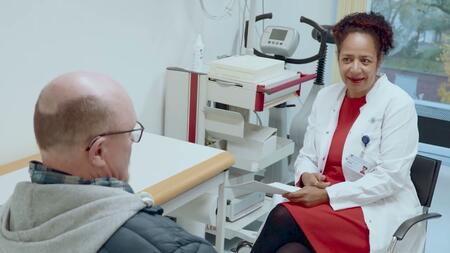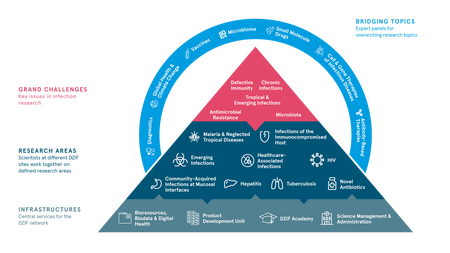
Portrait
United against infections
The corona pandemic has made it clear how important infection research is. However, the emergence and spread of unknown viruses such as, most recently, SARS-CoV-2 is not new. Since the foundation of the German Center for Infection Research (DZIF) in 2012, its researchers have been placing a clear focus on this issue with the "Emerging Infections" research area.
Other problems in infection research also require decisive action: Chronic infections, growing numbers of immunocompromised patients in an increasingly elderly society, the global spread of antibiotic resistance along with the emerging viruses are among the major challenges in infectiology of our time. Our infection research activities are strategically focused on meeting these challenges.
To this end, we at the DZIF have pooled the expertise of over 700 researchers from 35 member institutions and from a wide range of fields—including medicine, biology, epidemiology, chemistry and bioinformatics.
Research at the DZIF
In nine research areas and four overarching infrastructures, we are addressing the grand infectious disease challenges of our time:
- Antimicrobial resistance: Many pathogens no longer respond to common antibiotics.
- Chronic infections such as HIV, hepatitis or tuberculosis.
- Defective immunity: Immunocompromised people are particularly at risk of infections
- Microbiota: An imbalance in the microbiota of the gut, skin or lungs can promote infection and influence the course of many diseases.
- Tropical and emerging infections such as malaria, Ebola or COVID-19.
Research areas—focusing on the major common diseases
The DZIF bundles projects in nine research areas, each dedicated to a pathogen, a specific disease or a common topic within infection research. Alongside "Emerging Infections", "Healthcare-Associated Infections", "Novel Antibiotics", "HIV", "Hepatitis", "Tuberculosis" and "Malaria and Neglected Tropical Diseases" are the focus of research—as are "Community-Acquired Infections at Mucosal Interfaces" and "Infections of the Immunocompromised Host".
Bridging topics
Important current and cross-research area developments are addressed and coordinated at the DZIF as "Bridging Topics" by a panel of experts on an interdisciplinary basis. Three groups on the following topics have been established so far:
- Antibody-based therapies
- Cell and gene therapies of infectious diseases
- Diagnostics
- Global Health and Climate Change
- Microbiome
- and Vaccines
Infrastructures—joint service facilities and DZIF Academy
The infrastructures offer the DZIF scientists support in their research. The development of a new drug raises many questions that even researchers cannot answer easily. This is where the "Product Development Unit" offers advice and support. The DZIF infrastructure "Bioresources, Biodata and Digital Health", for example, provides researchers with tissue and cell samples.
The DZIF Academy—supporting and promoting young talent
Since our foundation, we have been working to ensure that young researchers and doctors can successfully embark on a career in infection research. The DZIF Academy was established with this in mind. The Academy awards scholarships to young parents and doctors, which allow them to who leave clinical practice and enter research instead.
Globalization—thinking and acting without borders
SARS-CoV-2 has been a vivid reminder that infections do not respect borders. Infection researchers must think and act internationally. This is precisely what we at the DZIF have been doing from the outset: Our researchers are working closely with partner institutions in Africa and Europe. The DZIF is also committed to the vaccine initiative CEPI and is one of ten partners in the CARB-X Global Accelerator network. CARB-X accelerates projects worldwide to develop new drugs in the fight against antibiotic-resistant germs.
Working together for a strong research culture
At the DZIF, integrity, responsibility, and cooperation are at the heart of our scientific work. We promote a working environment characterized by trust, respect, fairness, and openness—both in our dealings with each other and in our cooperation with external partners. We regard diversity, inclusion, and equal opportunities as enriching and essential for innovation.
Our actions are guided by the principles of good scientific practice, the responsible use of resources, and the consistent protection of data and personal rights. In doing so, we are committed not only to science but also to the common good.
These values form the basis of our compliance rules and are binding standards for all DZIF employees.
The foundation was initiated by the Ministry of Research
In 2012, the Federal Ministry of Education and Research (BMBF) took the initiative to establish the DZIF. Since 2025, the ministry has been known as the "Federal Ministry of Research, Technology and Space" (BMFTR). The DZIF comprises 35 university and non-university member institutions across seven partner sites in Germany. DZIF projects and funding programs receive 90 percent of their financing from federal funds and 10 percent from the participating states. In addition to the DZIF there are seven other German Centers for Health Research dedicated to combating common diseases.


